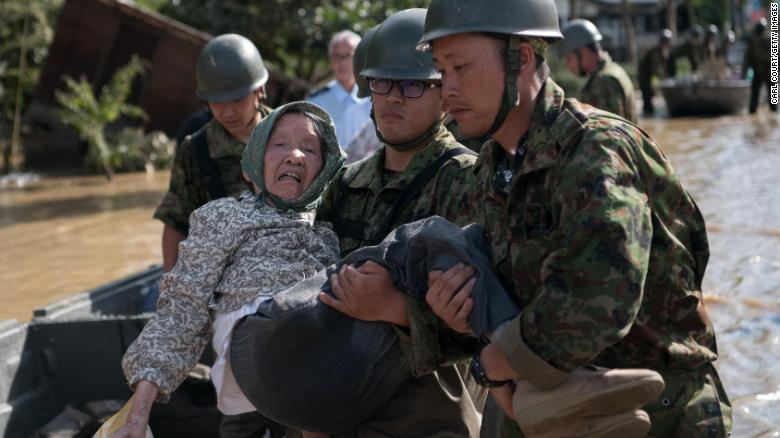HIROSHIMA (Kyodo) -- Hundreds of thousands of people in western Japan affected by devastating floods and landslides on Wednesday continued to struggle with water outages, while the death toll of the country's worst rain-related disaster in decades climbed to 176 with scores more still missing.
At least 254,084 homes are still cut off from the water supply in Hiroshima, Ehime and Okayama, the prefectures hit hardest by last week's torrential rains, according to the welfare ministry.
About 1,100 homes in other nine prefectures, including Osaka, Yamaguchi and Tokushima, are also without water and there are no prospects of the supply being restored, the ministry said.
Many of those who managed to evacuate have relied on water supplied by local municipalities and the Self-Defense Forces.
Fourteen cities and towns in Hiroshima Prefecture have been affected by water cut-offs following a number of mudslides that caused burst water pipes and power outages at distribution reservoirs.
In the city of Kure, where more than 10 people died, water was distributed at schools and other public facilities after a center managing the water supply was destroyed by mud and sand. The suspension has affected around 93,000 homes, most of the city's residents.
Masakazu Furusho, 65, was one of many residents who came to a water distribution point at an elementary school in Kure.
"I have to go back and forth between my home and the school three times a day," he said, adding he wants to know when the water system will be restored.
In Ehime Prefecture, water supply facilities were destroyed in nine municipalities, affecting some hospitals, with local officials saying they are yet to fully grasp the extent of the damage
Some municipalities in Okayama Prefecture, including Kurashiki and Takahashi, are still finding it difficult to supply drinkable water as purification plants were submerged by the flooding.
Susumu Nakano, the head of the Research Center for Management of Disaster and Environment at Tokushima University, said water facilities are often located close to rivers and they are vulnerable to floods.
"Compared to earthquakes, there are not enough measures," he said. "It is necessary to make efforts on the assumption that there will be flooding."
source: mainichi.jp


